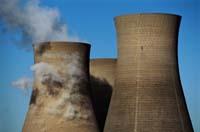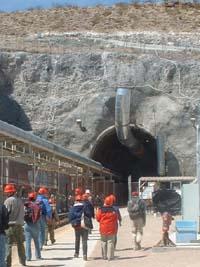Controversial nuclear resurrection

In any case, the list of countries that are planning to build new nuclear power plants is spreading day by day in Europe and around the world: France, Great Britain, United States, China, Finland... Climate change and the oil crisis have given the perfect excuse to convince society of the benefit of nuclear energy: plants do not use oil to produce energy, and produce much electricity without emitting carbon dioxide or other gases that increase the greenhouse effect to the atmosphere.
Most renewable energies have these characteristics, i.e., solar, wind, geothermal, hydraulic and marine energy either depend on oil or emit greenhouse gases. However, its proponents see clear advantages to nuclear energy. One of them is the amount of energy they generate, which by working generate much more energy than others, and continuously and continuously. They do not depend on the sun or the wind.
Another advantage is that nuclear energy is raw material. Nuclear power plants use uranium to generate electricity and the uranium market is more stable than oil. In fact, the largest uranium mines are in politically stable countries: Australia, the United States and Canada. They have reserves for a few decades and start looking for new uranium minerals.
It seems that the discourse of the supporters of nuclear power plants affects the people and, at least in Europe, is changing attitude. The Eurobarometer reflects the opinion of the inhabitants of the European Union and in its latest report it is reflected that in three years, since 2005, the total rejection of nuclear power plants has been greatly softened: In 2005 the percentage was 24%, compared to 17% this year. What's more, in 2005 31% were quite against, compared to 28% in 2008. Thus, three years ago, more than half were against, to a greater or lesser extent (55% in particular), but now the proportion of people opposed to nuclear power plants does not reach half (45%).
The favorable opinion has been strengthened almost to the same extent that the opposition has descended: In 2005, 7% were totally in favor and 30% in favor, compared to 11% and 33% in favor. Men are the most favorable: half of men are in favor and only a third of women. There are also differences of opinion depending on the political trend: the position of the right is more pronounced than that of the left. And those who hold high positions at work are also more favorable than those who have simpler jobs. However, it should be noted that the charges are mostly men and many are right-wing...
Security in question

A team of engineers enters the Yucca Mountain warehouse. (Photo: D. Mayer)
The next question in the Eurobarometer report focused solely on nuclear detractors, and is that if there was a definitive and safe solution for nuclear waste, would it be for or against nuclear power plants? In this case, 39% of respondents would change their minds, compared to 48% who did not. In addition, 8% responded that this option is not possible, that is, it is not possible to find a safe and definitive solution for nuclear waste. And that response was not in the survey, among the options, it arose spontaneously. However, the pollsters received it.
Therefore, although the trend is changing, nuclear waste continues to have a great concern. According to the survey, 93% of Europeans think that the solution to waste should be now, without leaving the problem for the next generations. But they are not very optimistic: 7 out of 10 say there is no safe way to eliminate high-level nuclear radioactivity waste.
At the moment, the waste of nuclear power plants are deposited in the plants where they have been generated, in the inactivation rafts. Water absorbs radiation and heat from radioactive materials and, in turn, gradually decreases (very slowly) the level of radioactivity.
Looking ahead, they look for geologically stable areas to bury in depth. They haven't saved it anywhere yet, but these types of warehouses are already being prepared, like the Yucca Mountain in the United States. According to the engineers they have designed, it is completely safe. The way to carry waste there should be completely safe...
Despite major safety measures, there is always a risk of accidents. In Spain, the last episode of alarm occurred in Asco: in November last year there was a radiation leak. Months later, the Spanish Nuclear Security Council recognized that the leak was superior to the one initially mentioned, specifically 750 times higher. For them, the dangers of nuclear power plants leave the arguments of the supporters bankrupt.
Published in Gara
Buletina
Bidali zure helbide elektronikoa eta jaso asteroko buletina zure sarrera-ontzian











